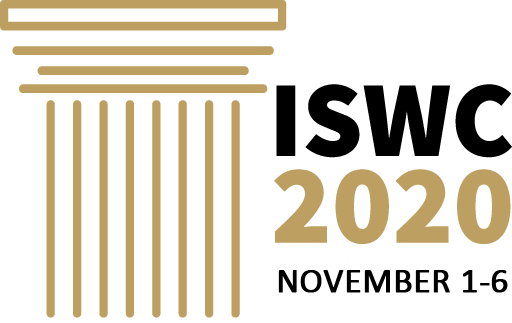Call for Posters & Demos
The ISWC 2020 Posters and Demos track complements the paper tracks of the conference by offering an opportunity to present late-breaking research results, on-going research or resource projects, and speculative or innovative work in progress. The informal setting of the Posters and Demos track encourages presenters and participants to engage in discussions about the work. Such discussions can be invaluable inputs for the future work of the presenters while offering participants an effective way to broaden their knowledge of emerging research trends and to network with other researchers.
We invite submissions relevant to the area of the Semantic Web and which address, but are not limited to, the topics of the Research Track, the Resources Track, the In-Use Track, and the Industry Track. We also invite Vision papers, Position papers, Outrageous ideas, Novel but thoughtful speculation, and Humorous thoughts (or similar).
- Posters that describe Semantic Web software systems (free or commercial), and on-going or completed research work are welcome.
- Demonstrations are intended to showcase innovative Semantic Web related implementations and technologies, arising both from academia and industry.
We welcome submissions from the industry. However, submissions must not have the character of an advertisement or commercial product description and must convey a novel solution to an explicit problem.
Authors of full papers accepted for the Research Track, the Resources Track, and the In-Use Track are encouraged to additionally submit a poster or demonstration about their work to this Posters and Demos track. The submission should be formatted as other submissions to this track, but it must also cite the accepted full paper and include a description of how it complements or adds value to the conference paper. The added value could include: a) extended results and experiments not presented in the conference paper for reasons of space, or b) a demonstration of a supporting prototype implementation.
Submission
Authors must submit a four-page extended abstract for evaluation. All submissions will undergo a common review process, including those related to already accepted full papers. For demonstrations, authors are strongly encouraged to include in their submission a link to where the demo (live or recorded video) can be found. They should also make clear exactly what will be demonstrated to the participants (e.g., what datasets will be used, which functionalities will be shown, etc).
We strongly encourage authors to specify the type of submission before the first section of the paper (e.g., immediately after the abstract).
All submissions must be made electronically via EasyChair.
Submissions must be either in PDF or in HTML. Submissions in PDF must adopt the style of the Springer Publications format for Lecture Notes in Computer Science (LNCS). Details are provided on Springer’s Information for Authors page. Submissions that exceed the page limit will be rejected without review. For details on the HTML format, see the HTML submission guide.
At least one of the authors must be a registered participant at the main conference, and attend the Poster and Demo Session to present the work. The abstracts of accepted posters and demonstrations will be published on the conference website. They will be compiled into a CEUR Workshop Proceedings for Web retrieval and archiving. They will not be published in the Springer conference proceedings.
The metadata for all accepted submissions will be included in the conference metadata corpus. Detailed information about metadata creation will be provided with the acceptance notification of the successful submissions.
As in previous years, student-authors of accepted submissions will be able to apply for travel support to attend the conference.
Reviews and Review Criteria
All submissions to the Posters & Demos Track will be reviewed by at least three program committee members. Decisions about acceptance will be based on relevance to the Semantic Web, originality, potential significance, relevance, clarity, and potential for entertainment. The purpose of the track is to allow the presentation of preliminary results to the community, provided that originality and significance of the contribution are ensured. Authors submitting a demonstration are strongly encouraged to include in the paper a pointer to an online demo or video of the application to be presented. The absence of a pointer will affect the overall evaluation of the submission.
Virtual Presentation Format
In the virtual setting of ISWC 2020, the Posters and Demos track will take form based on two short videos describing the work submitted, or performing the demo. No physical (or digital) poster is required for accepted posters or demos. For the final “camera-ready” version of accepted posters or demos, authors are required to submit (1) the camera-ready form of the extended abstract; (2) a 1-minute “teaser” video briefly describing the work; and (3) a second longer video with no fixed time limit (although we encourage authors to aim for around 10 minutes). The teaser videos will be compiled and shown in the main conference program. They are intended to invite attendees to view the longer video-descriptions of the works, and to talk with the authors during pre-scheduled “drop-in” sessions during the conference (via dedicated teleconference links). Both teaser and longer videos of posters and demos will be available to ISWC attendees throughout the conference.
Important Dates
| Activities | Due Date |
| Submissions due | June 26, 2020 August 17,2020 |
| Notifications | July 31, 2020 September 11, 2020 |
| Camera-ready papers due | August 21, 2020 September 21, 2020 |
All deadlines are 23:59 AoE (anywhere on Earth).
Program Chairs
Contact: iswc2020-poster-demo@easychair.org
- Kerry Taylor
Australian National University, Australia
- Rafael Gonçalves
Stanford University, USA
Call For Papers!
Click on the button to view the joint ISWC "Call for papers
